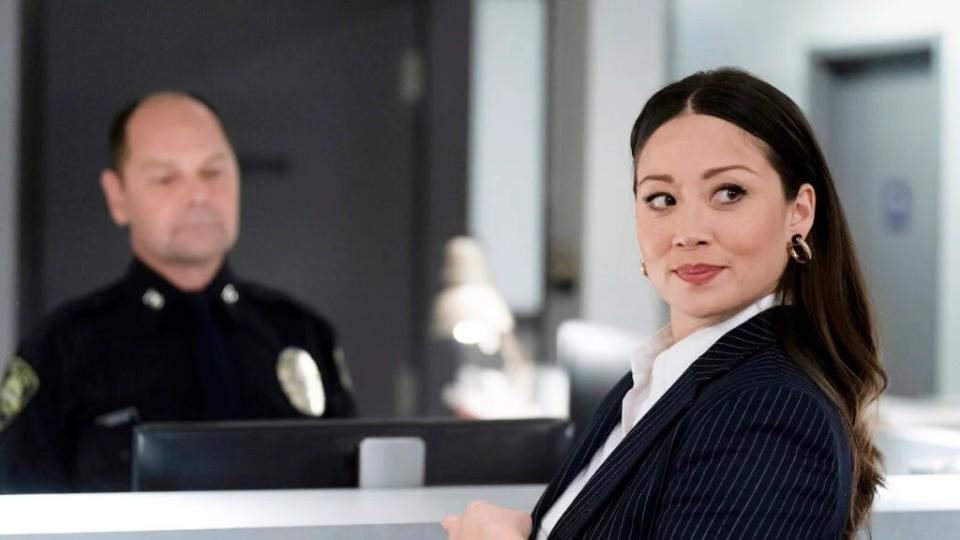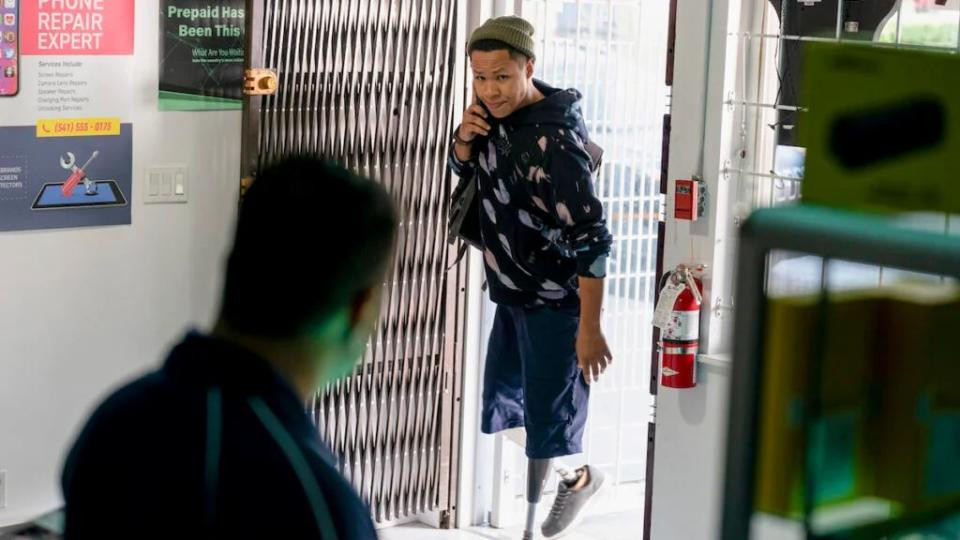“Who Is The Lawyer On Tracker” is a frequently asked question by viewers intrigued by the CBS series. In “Tracker,” Colter Shaw, played by Justin Hartley, relies on a network of experts, including a savvy lawyer, to navigate the legal complexities of his work as a reward-seeking survivalist. Internetlawyers.net can help you explore the role of legal experts in the show and the importance of legal counsel in high-stakes situations. Discover the key characters and how their expertise contributes to Colter’s success, enhancing your understanding of both the show and the broader legal landscape through our legal resources, attorney directory, and expert legal advice.
1. Who Is Reenie Greene in “Tracker?”
Fiona Rene portrays Reenie Greene, the formidable lawyer on “Tracker.” Reenie is not just Colter Shaw’s legal counsel; she is a crucial part of his support system, often bailing him out of tricky situations. According to CBS, Reenie and Colter share a complex history that adds depth to their professional relationship.
1.1 What Are Reenie Greene’s Responsibilities?
Reenie Greene handles various legal tasks for Colter, including:
- Legal Consultation: Providing advice on the legality of Colter’s actions.
- Crisis Management: Stepping in when Colter faces legal trouble.
- Contract Negotiation: Assisting with reward agreements and other contracts.
- Risk Assessment: Evaluating potential legal risks associated with Colter’s missions.
1.2 Why Is Legal Representation Important for Someone Like Colter Shaw?
Colter’s work as a survivalist and tracker often places him in legally ambiguous situations. Legal representation is essential for several reasons:
- Protection from Liability: Ensuring Colter doesn’t face undue legal consequences.
- Compliance with Laws: Helping Colter navigate the legal landscape of different states.
- Negotiating Contracts: Ensuring fair agreements for Colter’s services.
- Managing Risks: Providing advice on how to minimize legal risks during missions.
 Fiona Rene as Reenie Green. (Michael Courtney/CBS)
Fiona Rene as Reenie Green. (Michael Courtney/CBS)
2. What Kind of Lawyer Is Reenie Greene?
While “Tracker” does not explicitly state Reenie Greene’s specific legal specialization, her role suggests she is likely a versatile attorney with expertise in multiple areas. According to legal experts, a lawyer in her position would ideally have a background in criminal law, contract law, and civil litigation.
2.1 Areas of Law Relevant to Reenie Greene’s Role
- Criminal Law: To defend Colter against potential charges arising from his missions.
- Contract Law: To negotiate and review agreements related to his rewards.
- Civil Litigation: To represent Colter in potential lawsuits.
- Personal Injury Law: Given the dangerous nature of Colter’s work, knowledge of personal injury claims could be beneficial.
- Property Law: Colter’s tracking activities might involve property rights and trespass issues.
2.2 How Does Reenie Greene’s Legal Expertise Benefit Colter Shaw?
Reenie’s expertise provides Colter with:
- Legal Protection: Ensuring he doesn’t inadvertently break the law.
- Strategic Advice: Helping him make informed decisions about his missions.
- Negotiating Power: Assisting him in securing fair compensation for his work.
- Peace of Mind: Knowing he has a legal expert on his side.
3. Why Is It Important to Have a Lawyer When Involved in High-Risk Activities?
Engaging in high-risk activities like those Colter Shaw undertakes can expose individuals to significant legal liabilities. A lawyer can provide essential protection and guidance. According to the American Bar Association (ABA), having legal counsel can significantly reduce the risk of adverse legal outcomes.
3.1 Key Benefits of Legal Representation in High-Risk Scenarios
- Risk Mitigation: Lawyers can identify potential legal risks and advise on how to avoid them.
- Liability Protection: They can help structure activities to minimize personal liability.
- Contractual Safeguards: Lawyers can ensure that contracts are fair and protect your interests.
- Defense Against Claims: If a claim is made against you, a lawyer can provide a strong defense.
- Negotiation Skills: Lawyers can negotiate on your behalf to reach favorable settlements.
3.2 Real-World Examples of Legal Issues in High-Risk Activities
- Personal Injury Claims: If someone is injured during your activity, they may sue you for negligence.
- Property Damage: You could be held liable for damage to property caused by your actions.
- Contract Disputes: Disagreements over payment or services can lead to legal battles.
- Criminal Charges: Depending on the activity, you could face charges such as trespassing or assault.
4. How Does Reenie Greene’s Character Impact the “Tracker” Narrative?
Reenie Greene’s character adds depth and complexity to “Tracker.” According to TV critics, her presence provides a realistic portrayal of the support system needed for someone in Colter’s line of work.
4.1 Reenie’s Role in Providing Realism
- Legal Accuracy: Reenie ensures that the show touches on relevant legal considerations.
- Professional Dynamic: She showcases the importance of having a legal expert on your team.
- Character Development: Her interactions with Colter reveal more about his past and motivations.
4.2 How Does Reenie’s Relationship with Colter Influence the Story?
- Romantic Tension: The unresolved romantic history between Reenie and Colter adds an emotional layer to the show.
- Conflicting Interests: Their personal history can sometimes complicate their professional relationship.
- Character Growth: Reenie challenges Colter to confront his past and make better choices.
5. What Are the Ethical Considerations for a Lawyer Representing Someone Like Colter Shaw?
Lawyers representing clients in high-risk professions face unique ethical challenges. According to the American Bar Association’s Model Rules of Professional Conduct, lawyers must balance their duty to zealously represent their clients with their ethical obligations.
5.1 Key Ethical Considerations
- Confidentiality: Lawyers must keep client information confidential, even if it involves illegal activities.
- Candor to the Tribunal: Lawyers must be honest with the court and not present false evidence.
- Conflict of Interest: Lawyers must avoid situations where their interests conflict with those of their clients.
- Competence: Lawyers must provide competent representation, meaning they must be knowledgeable and skilled in the relevant area of law.
- Duty to Disclose: In some cases, lawyers may have a duty to disclose information to prevent harm to others.
5.2 How Might These Considerations Apply to Reenie Greene?
- Balancing Confidentiality and Public Safety: If Colter is involved in a situation that threatens public safety, Reenie may need to weigh her duty of confidentiality against her obligation to prevent harm.
- Avoiding Conflicts of Interest: Reenie must ensure that her personal feelings for Colter do not cloud her judgment or compromise her ability to represent him effectively.
- Providing Competent Advice: Reenie must stay up-to-date on the latest legal developments to provide Colter with the best possible advice.
6. How Can Internetlawyers.Net Help You Find a Lawyer?
If you find yourself in a situation where you need legal representation, Internetlawyers.net is here to help. Our platform connects you with experienced attorneys who can provide the guidance and support you need.
6.1 Key Features of Internetlawyers.Net
- Attorney Directory: Search our comprehensive directory to find lawyers in your area.
- Legal Resources: Access articles, guides, and other resources to learn more about the law.
- Expert Advice: Get answers to your legal questions from qualified attorneys.
- Case Evaluation: Submit your case for a free evaluation by a lawyer.
6.2 How to Use Internetlawyers.Net to Find the Right Lawyer
- Search the Directory: Use our search filters to find lawyers who specialize in the area of law relevant to your needs.
- Read Attorney Profiles: Review attorney profiles to learn about their experience, qualifications, and areas of practice.
- Contact Attorneys: Reach out to attorneys directly to schedule a consultation.
- Evaluate Your Options: Compare your options and choose the lawyer who is the best fit for your needs.
 Abby McEnany as Velma Bruin and Robin Weigert as Teddi Bruin. (Michael Courtney/CBS)
Abby McEnany as Velma Bruin and Robin Weigert as Teddi Bruin. (Michael Courtney/CBS)
7. What Are Some Common Legal Issues Faced by Survivalists and Trackers?
Survivalists and trackers often encounter unique legal challenges due to the nature of their activities. Understanding these issues can help individuals in these professions avoid potential legal pitfalls.
7.1 Common Legal Issues
- Trespassing: Entering private property without permission can lead to criminal charges and civil lawsuits.
- Property Damage: Causing damage to property, whether intentionally or unintentionally, can result in liability.
- Environmental Violations: Disturbing protected habitats or violating environmental regulations can lead to fines and penalties.
- Firearms Laws: Carrying firearms in certain areas may be restricted or require permits.
- Search and Rescue Laws: Laws governing search and rescue operations can vary by jurisdiction.
7.2 How to Avoid These Legal Issues
- Obtain Permission: Always seek permission before entering private property.
- Respect the Environment: Avoid disturbing protected habitats or violating environmental regulations.
- Comply with Firearms Laws: Know and follow all applicable firearms laws.
- Seek Legal Advice: Consult with a lawyer to understand your rights and obligations.
8. The Importance of Due Diligence in High-Risk Reward Missions
Colter Shaw’s missions often involve high stakes and potential dangers. Conducting thorough due diligence is crucial to ensure the safety and legality of these operations.
8.1 What Is Due Diligence?
Due diligence is the process of investigating and verifying information before entering into an agreement or undertaking an activity. It involves gathering relevant facts, assessing risks, and making informed decisions.
8.2 Why Is Due Diligence Important?
- Risk Assessment: Due diligence helps identify potential risks and allows for informed decision-making.
- Legal Compliance: Ensuring that all activities comply with applicable laws and regulations.
- Financial Protection: Verifying the legitimacy of rewards and preventing fraud.
- Safety: Assessing potential dangers and taking appropriate precautions.
8.3 Steps Involved in Due Diligence
- Gather Information: Collect all relevant information about the mission, including the location, people involved, and potential risks.
- Verify Facts: Confirm the accuracy of the information through independent sources.
- Assess Risks: Evaluate the potential risks and develop strategies to mitigate them.
- Seek Legal Advice: Consult with a lawyer to ensure compliance with all applicable laws and regulations.
- Make an Informed Decision: Weigh the risks and benefits before proceeding with the mission.
9. How Does TV’s Portrayal of Lawyers Compare to Reality?
Television shows often depict lawyers in a glamorous or dramatic light, which may not always reflect reality. Understanding the differences between TV portrayals and real-world legal practice can provide a more accurate perspective.
9.1 Common TV Tropes About Lawyers
- High-Stakes Drama: TV lawyers are often involved in high-profile cases with dramatic courtroom battles.
- Moral Ambiguity: Some TV lawyers are portrayed as willing to bend the rules or engage in unethical behavior to win.
- Quick Resolutions: TV cases are often resolved quickly, sometimes within a single episode.
- Larger-than-Life Personalities: TV lawyers often have charismatic and larger-than-life personalities.
9.2 The Reality of Legal Practice
- Everyday Cases: Most lawyers handle routine cases such as contracts, real estate transactions, and family law matters.
- Ethical Obligations: Lawyers are bound by strict ethical rules and must act with integrity and professionalism.
- Time-Consuming Process: Legal cases can take months or even years to resolve.
- Dedication and Hard Work: Lawyers work long hours and must be dedicated to their clients and the pursuit of justice.
9.3 How “Tracker” Stacks Up
“Tracker” attempts to strike a balance between entertainment and realism. While the show may exaggerate some aspects of legal practice, it also highlights the importance of legal expertise and ethical considerations.
10. What Should You Do If You Need Legal Help?
If you find yourself in a situation where you need legal assistance, it’s essential to take the right steps to protect your rights and interests.
10.1 Steps to Take When You Need Legal Help
- Assess Your Situation: Determine the nature of your legal issue and what type of lawyer you need.
- Gather Information: Collect all relevant documents and information related to your case.
- Seek Legal Advice: Consult with a lawyer to discuss your options and receive guidance.
- Hire a Lawyer: If you decide to proceed with legal action, hire a lawyer to represent you.
- Communicate with Your Lawyer: Maintain open and honest communication with your lawyer throughout the process.
10.2 How Internetlawyers.Net Can Assist You
Internetlawyers.Net is your comprehensive resource for finding legal assistance. With our extensive attorney directory, informative legal resources, and expert advice, we can help you navigate the legal landscape and find the right lawyer for your needs.
10.3 Contact Information
For further assistance, you can reach us at:
- Address: 111 Broadway, New York, NY 10006, United States
- Phone: +1 (212) 555-1212
- Website: internetlawyers.net
 Eric Graise as Bobby Exley in “Tracker” (Michael Courtney/CBS)
Eric Graise as Bobby Exley in “Tracker” (Michael Courtney/CBS)
FAQ: Your Questions About Lawyers and Legal Matters Answered
1. What does a lawyer do?
A lawyer provides legal advice, represents clients in court, drafts legal documents, and negotiates settlements. They ensure that their clients understand their rights and obligations under the law.
2. How do I find the right lawyer for my case?
You can find the right lawyer by searching online directories like Internetlawyers.net, asking for referrals, and checking the lawyer’s credentials and experience. It’s crucial to find someone who specializes in the area of law relevant to your issue.
3. What should I expect during my first meeting with a lawyer?
During your first meeting, expect to discuss your legal issue, the lawyer’s fees, and the potential strategies for your case. Bring all relevant documents and be prepared to answer questions about your situation.
4. How much does it cost to hire a lawyer?
The cost of hiring a lawyer varies depending on the type of case, the lawyer’s experience, and the fee structure. Lawyers may charge hourly rates, flat fees, or contingency fees, where they receive a percentage of any settlement or award.
5. What is attorney-client privilege?
Attorney-client privilege protects confidential communications between a lawyer and their client. This means that the lawyer cannot disclose these communications to anyone else without the client’s consent, ensuring open and honest discussions.
6. What is the difference between a criminal lawyer and a civil lawyer?
A criminal lawyer represents clients accused of crimes, while a civil lawyer represents clients in disputes involving private rights and remedies. Criminal cases involve the government prosecuting someone, while civil cases involve disputes between individuals or organizations.
7. What is a legal consultation?
A legal consultation is a meeting with a lawyer to discuss your legal issue and receive advice. It’s an opportunity to ask questions, understand your options, and determine whether you want to hire the lawyer.
8. How can I prepare for a legal consultation?
Prepare by gathering all relevant documents, writing down your questions, and summarizing the key facts of your case. This will help the lawyer understand your situation quickly and provide the most effective advice.
9. What are some common legal mistakes to avoid?
Common legal mistakes include not seeking legal advice when needed, failing to gather and preserve evidence, and not meeting deadlines. Consulting with a lawyer early can help you avoid these pitfalls.
10. How does Internetlawyers.net ensure the quality of its listed lawyers?
Internetlawyers.net verifies the credentials and licensing of the lawyers listed in its directory. We also encourage users to provide feedback and reviews to help maintain the quality of our listings.
By understanding the role of lawyers in shows like “Tracker” and seeking legal assistance when needed, you can navigate the legal landscape with confidence and protect your rights. Visit internetlawyers.net today to find the right lawyer for your needs and access valuable legal resources.
